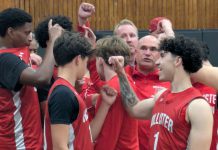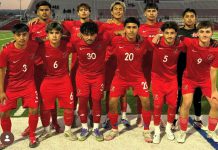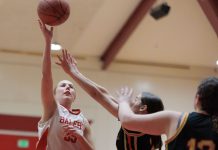Area hardballers are learning the ropes in the minor leagues
Minor league baseball is all about the wake-up calls.
There are the literal ringing telephones – like the 6:45am calls former San Benito High standout Daniel Barone gets each morning, telling him to get showered and on the bus for another day at the ballpark or on the road with the Jupiter Marlins.
There’s the reality check of life as a professional baseball player – a life that Donna Villafuerte, mother of Live Oak product and Fresno Giant Brandon Villafuerte says few raw kids are prepared for when they sign.
There are wake-up calls for a ballplayer’s friends and family who are used to seeing their favorite player actually play. Paul Gimenez, father of ex-Gilroy High star and current Lake County Captains third baseman Chris Gimenez, watched Chris play every game at Gilroy and even traveled to quite a few of his college games at Nevada-Reno. Now he tries to catch the Captains on Internet radio and hopes to get out to East Lake, Ohio for a homestand this summer.
And, of course, there are the physical wake-up calls for players facing better talent than they ever have. The pitcher who blew fastballs by hitters in junior college, but gets hammered into the bleachers in pro ball. The slick fielder who wowed the crowds in high school, but looks like he’s moving in slow motion compared to that vacuum cleaner of a shortstop from the Dominican.
The life of a professional ballplayer isn’t glamorous in the beginning. For the overwhelming majority of pros, it never will be. High school stars from places like Gilroy, Hollister and Morgan Hill are featured in the local newspapers. If they go on to play at a local college, they may continue to be big shots in the community.
Then they go professional, taking their games to small towns all the way across the country. Local fans lose track of them as new, younger talents appear at home – out of sight, out of mind. The minor leaguer goes from being everybody’s All American all the way back to being the private property of his closest relatives, who alone track their boy’s progress, his ups and downs.
At some point, if the minor leaguer falls off the fast track to the major leagues, the fear sets in. Nobody wants to be a real-life Crash Davis, a career Bush Leaguer who keeps plugging away at a kid’s game when everybody else has gone off to be grown-ups.
End of illusions
“These kids have the wrong idea when they sign,” says Donna Villafuerte. “When you’re drafted and you sign, I’ve seen a lot of families that get so excited. We knew it was coming (for Brandon) so we researched what life was like in the minor leagues. So many kids have this idea that life (in the pros) is so wonderful, but it’s not. It’s tough.
“When you’re young you think, ‘I’m going to play pro ball and it’s going to be so great.'”
Donna’s son has done what so few ballplayers ever achieve – reach the majors. The Fresno relief pitcher tossed 20 innings for the Arizona Diamondbacks in 2004, and is a top candidate to be called up by the San Francisco Giants this season.
Yet life as a pro has taken its toll on Brandon Villafuerte. Last July, the 29-year-old pitcher refused an assignment to Triple-A Tucson and became a free agent.
“For me, I think the quitting point would come when I don’t want to go back to the ballpark every day,” the Live Oak and West Valley College product says.
“Last year, I needed to take a step away from the game,” he adds, relating that all the losses on an awful Diamondbacks club began to take their toll on his psyche.
“The time off really helped me,” says Villafuerte. “So I had my own time off, and by the time the teams came calling around November during free agency, I was ready to get back into it.
“You’ve got to love this life. The payoff is the first time you’re called up (to the majors). The first time it happens is a real shocker. I’ve been doing this for six years, but it’s still a big thrill when you get up there.”
When Hollister’s Barone got drafted by the Florida Marlins, the right-handed reliever had some idea of what life in the pros was like. His grandfather, Dick Barone, played big league ball for the Pittsburgh Pirates in the 1960’s.
Still, Daniel Barone wasn’t immune to the little kid’s fantasy of life as a ballplayer.
“No, it isn’t everything I expected,” says Barone, who was drafted out of Sonoma State by the Marlins organization in 2004 and spent last summer with the Jamestown Jammers in the low A New York-Penn League.
“When you hear ‘pro ball,’ you think you get everything handed to you. But you’re like a freshman (in high school). You have to pay your dues.”
The day-to-day grind of Single A ball in the Gulf League is relentless, says Barone, who fills a middle relief role with the Jupiter club that includes some spot-closing duties.
“You’re always on a bus. The trips are really long and hot. We get $100 bucks a week (in pay) and some food vouchers (for meals).
“I wake up at about 6:45, hit the bus, get to the field and have some nasty eggs or french toast. I go to the training room to strengthen my shoulder. Then we have practice or a game. After that, go to the weight room. When you’re done lifting, you go to the bus, go to the hotel and get some dinner and some sleep.
“Then the next day, you do it all over again.”
Family and politics
Paul Gimenez knows all about what it’s like to have someone you care about toiling in the minor leagues. Before his son Chris was drafted by the Cleveland Indians organization, Paul Gimenez watched his cousin Brian Rogers struggle for seven years in the minors, trying to raise a family as he got within sniffing distance of the big leagues without ever making it.
“We know first-hand what problems there are, how tough it is for a young couple with kids, with the father gone for extended periods of time,” says the elder Gimenez.
“It’s just getting everybody else to understand that. Chris is very good with kids, so when he has children it’s going to be interesting to see how that affects him.
“I think you have to look at Brian as an example. He got to Triple A. He got moved up with the big league team in preseason, then brought back down to AAA. There are so many things that affect a person in that situation. If you know the right people, things go the pretty smoothly, if you’re just a player out there playing, and you don’t know the right people …”
Gimenez trails off, but his implication is one raised by many involved with professional baseball.
Scott Levander, a former minor leaguer in the Oakland A’s organization goes so far as to say, “I believe that the minor leagues are more political than Little League.”
Levander, who was selected in the 32nd round of the 1984 draft as a pitcher out of St. Mary’s College, says due to the economics of baseball, high draft picks will always be given many more chances than players in which a club has little money invested.
“They don’t necessarily care about results,” he says. “I don’t want to say it with sour grapes. But when you’ve got a kid who’s hitting .090 and the coach is saying, ‘I think Joe Smith is really coming along,’ because he’s a hundred-thousand dollar signing, you want to scream, ‘You go out there and pitch with that guy giving you your run support.”
For Paul Gimenez, such are the hazards of his 22-year-old son’s dream.
“We’re just hoping he can continue on for as long as he can,” he says.
With a second son, Gavilan starting pitcher Todd Gimenez, considering a baseball career, Paul Gimenez could be holding out such hopes for some time to come.
For love of the game
“You’ve got to love this life,” reiterates Brandon Villafuerte.
“It’s a pretty tough life. We play every day. We get one day off a month. In the minor leagues up to Double A, you’re busing to each city. Triple A is eaiser because you fly, but you get that early wake-up call and you’re on the first flight out.
“Your body’s got to get used to that kind of schedule.”
Levander talks about the tricks players learn to deal with living on a bus.
“We would get an inflatable raft and throw it up in the luggage rack, so we could get some sleep lying down,” he recalls.
Ballplayers famously play pranks on each other to relieve the boredom of life on the road.
“The other day, this one kid, they taped up his locker and they threw all his stuff in a bucket and they froze it,” laughs Barone. “All his clothes, his gloves and his cleats were frozen.
“They tied all of another guy’s clothes in a knot.”
Barone, who can look forward to a pay hike from his current $400 a month to a whopping $1500 a month when he gets moved back up to the Jamestown Jammers in June, clearly does it for more than the hijinks.
The righthander talks about “doing anything to stay in the game” he loves.
“I’d consider coaching,” he says, speaking with fondness of helping out at a preseason baseball clinic at San Benito High.
It’s a sentiment shared by Paul Gimenez for his son Chris.
“There’s a lot of ways to continue on in (baseball),” he says. “You can stay in the game a long time.”
Levander, who was formerly the circulation manager for the Gilroy Dispatch and Hollister Free Lance, believes he got out of baseball and into “the real world” too soon.
This despite the fact that he went abroad to pursue his dream after being cut by the A’s.
He and a friend traveled to South Africa on an open ticket in 1985. They found jobs with the Sea Point Cardinals of the Cape Town League.
“It was about the level of good junior college ball,” says Levander, who is proud of the fact that, “back then baseball was the only integrated sport in South Africa.”
The pitcher found himself converted to a catcher in South Africa. When he returned to the United States, he got an offer from the Montreal Expos to play for one of the club’s minor league affiliates.
He turned it down.
“I thought the $700 a month just wasn’t enough,” he says. “But you know what? I regret it.
“Being a switch-hitting catcher is the quickest ticket to the majors.”
Ultimately, very few minor leaguers will get that ticket to the big leagues. But as Villafuerte, Barone and Gimenez know so well, if you don’t at least give it a shot, you won’t have any kind of ticket at all.









